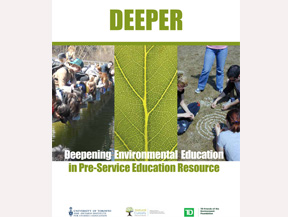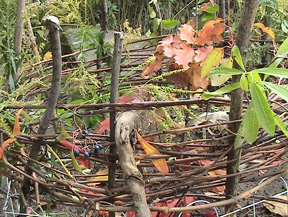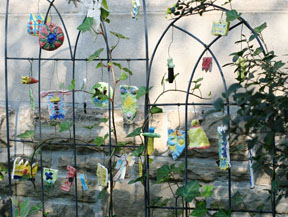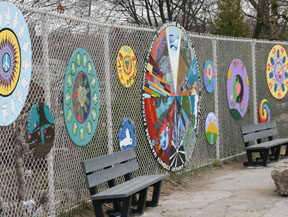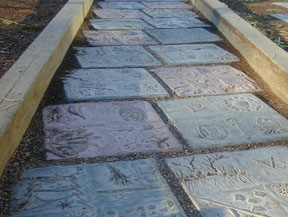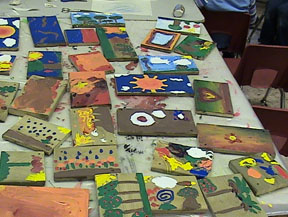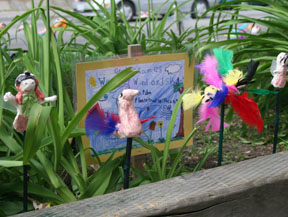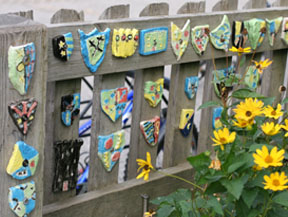comparing education for sustainable development in initial teachers education across four countries.
international journal of sustainability in higher education, 2021.
co-authors: N. evans, B. Christie, E. arlemalm-hagser
The purpose of this paper is to undertake a cross-comparative inquiry into Education for Sustainable Development (ESD) related to governance, initiatives and practices in initial teacher education (ITE) across four countries with very different contexts – Sweden, Scotland, Canada and Australia. It provides insights into issues arising internationally, implications for ESD in ITE and offers learnings for other countries and contexts. Read more...
innovative praxis for environmental learning in canadian faculties of education.
australian journal of environmental education, 2021.
co-authors: L. Sims, P. Elliott, & S. gerofsky
This article explores innovative praxis in Environmental and Sustainability Education (ESE) in four preservice teacher education programmes in Canada. ESE is finding its way into teacher education in a variety of innovative and interdisciplinary ways, as both part of mainstream programmes and in their co-curricular margins. Using a case study approach, each case builds on unique connections to Indigenous education, art education, cultural learning or educational gardening, which supports a variety of differing aspects in relation to ESE. These cases share a common theme of building relationships at the heart of ESE teaching and learning in the mainstream and the margins of the academy. Read more...
growing action research on environmental learning in schools: A school-university partnership.
educationAL Action Research, 2021.
A team of teacher-researchers in a large urban school board is working in partnership with researchers from a leading Canadian university to use action research to broaden and deepen environmental education in their teaching practice. This research-informed approach involves teachers, students and their communities in collaboratively deepening their knowledge and raising awareness about environmental issues, as well as devising local solutions to global environmental challenges in age-appropriate ways. This article shares the research of this innovative team by introducing their stories and the impact of their studies. Read more...
emerging praxis of environmental & sustainability education in teacher education in canada.
journal of philosophy in education, 2020.
This article contextualizes Neus Evans’ recommendations for moving Education for Sustainability in Teacher Education forward by introducing advances in this work in the context of Canadian faculties of education. By tracking the developments of a growing national network, and its contributions to research, practice and policy in this field, clear steps are being made to move from adaptation of the existing systems towards a wider transformation of education towards sustainability in Canada.
creating a climate of change: professional development in environmental & sustainability education through university & school board partnerships.
canadian journal of environmental education, 2020.
Co-Author: alysse kennedy.
With over eight million students, teachers, and professors in Canada, both pre-service and in-service K–12 teacher education are key to addressing the climate crisis through Environmental and Sustainability Education (ESE). Yet these approaches to professional learning in ESE are often delivered in isolation, with little precedence for bringing pre-service and in-service teachers together. This article explores this type of integrative professional development by introducing an innovative collaboration between a large Canadian pre-service teacher training program and an urban school board’s EcoSchools Program. It presents the initial findings of a three-year case study that tracks the impacts of this partnership; with some early successes already identified, this may prove to be an innovative addition to the research on how university/school board partnerships can effectively support professional learning in ESE. Read more...
conceptualizing art education as environmental activism in preservice teacher education
international journal of art and design education, 2020.
Co-Author: alysse kennedy.
This article explores how art and design education can contribute to the imperative of climate change and help societies adapt to living more sustainably. Drawing on methods from arts-based research and qualitative case study, it reports on a study that investigates what can be learned from creating environmental art installations with preservice teachers (those training to be K-12 teachers), as part of an environmental art education programme in a leading Canadian university. Findings support that preservice teachers experienced behavioural and attitudinal shifts towards sustainability after engaging in the processes of creating environmental art; involvement in the programme also provided opportunities for building community, engaging multiple domains of learning, modeling sustainable art-making practices, and prompting environmental activism. The results of this study inform a developing pedagogy for environmental art education in higher education settings. Read more...
growing innovative approaches to environmental & sustainability education in teacher education programs.
Environmental & Sustainability Education in teacher education. Springer 2019.
At the Ontario Institute for Studies in Education (OISE), in Toronto, we have taken a multipronged approach to developing and delivering environmental and sustainability education (ESE) in our teacher education programmes since 2008. As one of Canada’s largest faculties of education, we believed that a clear presence for ESE would support the creation of a culture of sustainability across the institution. The case study presented in this chapter tracks the ongoing development of OISE’s ESE Initiative that accomplished this goal through course-infused teaching, co-curricular programming, advocacy, research, and community partnerships. It documents our explorations in reaching and teaching hundreds of preservice teachers about ESE, as well as the unexpected and innovative ways we have moved closer to integrating sustainability across the institution.
environmental & sustainability education in teacher education programs: canadian perspectives.
Environmental & Sustainability Education in teacher education. Springer 2019.
Co-Authors: d. karrow, m. digiuseppe.
This introductory chapter tracks the development of the ESE in Teacher Education (ESE-TE) network in Canada through the ESE in Teacher Education National Roundtable in 2016.
preservice teacher environmental education capacities: what is the role of ontario's faculties of education?
Environmental & Sustainability Education in teacher education. Springer 2019.
Co-Authors: d. karrow, m. digiuseppe, x. fazio.
The development of environmental and sustainability education (ESE) in pre-service teacher education (PTE) in Canada has seen a slow but steady progress over the past 40 years; research studies, events, and organisations specific to the Canadian context have helped to broaden and deepen ESE in PTE in this country. As a detailed history or concise chronology of how individuals and groups have influenced the praxis of ESE in PTE in Canada does not yet exist, this chapter will identify some of these Canadian contributors in broad strokes. While not intended to be a completeor definitive history, the chapter recognises some of the contributions that have informed this work in recent decades and identifies where the field has been and the directions in which it is now headed in Canada.
Contextualizing ese in preservice teacher education in Canada.
Environmental & Sustainability Education in teacher education. Springer 2019.
Co-Author: paul elliott.
This chapter considers key provincial, national, and international events that have shaped progress in Environmental and Sustainability Education (ESE) in pre-service teacher education (PTE) in Canada. A case is made for significant reform in this field, and for new governmental policies to support such developments. A number of surveys, reports, and other forms of research indicate that progress has been frustratingly slow; however, more recent developments, often grassroot in nature, suggest that the situation is changing as more teacher education programmes start to incorporate components that promote ESE. The chapter also discusses different visions of what successful outcomes in ESE in PTE might entail.
growing a garden-based approach to art education.
Art Education Journal, July 2018.
Co-Author: Jennifer Sharpe.
This article discusses the potential of taking art education out of classrooms and into schoolyards, parks and other community sites, as a way to connect children's art-making to their natural and built communities. By drawing on nature-based and place-based education,, art educators can find new possibilites for natural and found art materials, innovative exhibition sites, as well as ways to make their school yards into rich learning grounds.
re-imagining Environmental Education as artistic practice.
International Perspectives on the Theory and Practice of Environmental Education, 2017. (SPRINGER)
Co-Author: Elizabeth Ashworth.
This chapter explores the potential of art education to increase the power and reach of environmental learning in teacher education programs and schools. The authors advocate for the inclusion of creativity, imagination, and aesthetics as powerful pedagogical tools to provide a means for teacher educators of the arts to contribute towards positive environmental change. Read more...
canadian perspectives on initial teacher environmental education praxis.
Canadian Association of Teacher Education, 2016.
Co-editors D. Karrow, M. DiGuiseppe, P. Elliott, H. Inwood, & Y. Gwekwerere.
This anthology shares recent research on the growing movement to integrate Environmental and Sustainability Education into Initial Teacher Education programs across Canada. Read more...
creative activism: deepening connection to urban environments through the arts.
URBAN Environmental Education Review. Cornell University Press, 2016.
Co-authored with J. HeimlicH, K. Ward, & J. Adams.
Often referred to as creative or artistic activism, environmental arts are becoming part of the curriculum in schools, universities, colleges, museums, and community centers, and they are being woven into the fabric of the city in unexpected spaces like parks, city streets, alleyways, and rooftops. This chapter provides an overview of some of the ways that the arts—visual arts, drama, dance, and music—are transforming environmental education in urban centers, and helping bring about cultural shifts toward sustainability. Read more...
initial teacher environmental education capacities.
What should Canadian teachers know? teacher capacities: knowledge, Beliefs, Skills. CATE, 2016.
Co-authored with D. KArrow, P. Elliott, M. DiGiuseppe, & X. Fazio.
International advice on what teachers—including Canadian teachers—should know, believe, and be able to do regarding environmental education (EE) were published as far back as 2005; in Ontario, Canada, this became manifest in one of the few Canadian provincial EE policy frameworks, Acting Today, Shaping Tomorrow. This chapter presents an argument for the development of IT-EE capacities, utilizing a generic model of Initial Teacher (IT) capacity involving IT “experiences/natures” and “competencies.” In particular, the chapter considers how IT-EE capacities may be described, identified, and cultivated within teacher education programs. Read more...
what’s growing on here? Garden-based pedagogy in a concrete jungle.
Environmental Education Research, 2015. DOI:10.1080/13504622.2014.997195
Co-authored with S. Jagger and E. Sperling.
This article summarizes a study that reflects on the development of the OISE Community Learning Garden over a two year period. Using a duoethnographic approach, the authors contextualize the garden's development within the burgeoning educational garden movement and analyze their understanding of the importance of this work in higher education. Read more...
going deeper: outdoor education and experiential learning in initial teacher education.
Pathways, 2015.
Co-Author: Darren Hoeg.
Decades of educational policy in Canada and the US have sidelined Outdoor Education (OE) as an integral part of initial teacher education (or pre-service) programs. As a result, few resources have been available to support faculty in teacher education programs wanting to design and implement outdoor learning experiences for their teacher candidates. This article shares promising OE practices in these programs in Ontario, providing exemplars for teacher educators who want to grow OE in their preservice courses. Read more...
exploring eco-art education in elementary classrooms
Independent Education, 2015.
This short article summarizes the results of a 2009 study that explored elementary teachers' ability to develop curriculu, in eco-art education. Read more...
Growing Together: Partnerships in Environmental and Sustainability Education.
Inquiry into practice: Learning Global Matters in Local Classrooms, 2014.
Co-Authors: PAm Miller & Jane Forbes.
This chapter reports on a study that investigated the potential of using school-university partnerships as a form of professional development in Environmental and Sustainability Education (ESE). Associate teachers and teacher candidates participated in collaborative environmental learning as part of their practica and internship placements; this form of professional development proved to be an excellent means for enhancing these educators’ knowledge and encouraging their practice of ESE, resulting in more frequent and richer experiences of environmental learning for themselves and their students. Read more...
land, learning and the arts.
Of Land and Living Skies Journal, 2014.
This short chapter introduces the field of environmental arts education as part of a special isue of this journal that focused on arts-based environmental learning. Read more...
DEEPER: Deepening Environmental Education in Pre-Service Resource.
OISE, University of Toronto, 2014.
Co-authored with S. Jagger.
This guide aims to support and inspire faculty, staff, and students to broaden and deepen the implementation of Environmental Education in pre-service education programs. It articulates a set of core competencies for all teacher candidates in Ontario, as well as a comprehensive set of strategies, practices and recommended resources to make this vision a reality. Read more...
Cultivating Artistic Approaches to Environmental Learning:
Exploring Eco-art Education in Elementary Classrooms.
International Electronic Journal of Environmental Education, 3(2), 2013.
This article explores curriculum development in eco-art education, an integration of art education and environmental education, as a means of increasing awareness of and engagement with the environment. As the first inquiry to examine eco-art education in a sustained way across multiple school sites, it aims to make a significant contribution to the emerging knowledge and growing discourse of eco-art education by demonstrating how arts-based learning at the elementary level can align with and support environmental education concepts and pedagogy. Read more...
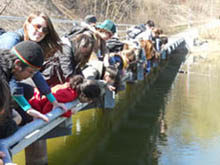
Creative approaches to environmental learning: Two perspectives on teaching environmental art education.
International Electronic Journal of Environmental Education, 2(1), 2012.
Co-authored with Dr. Ryan Taylor
This article compares the development and implementation of undergraduate courses in environmental art education. Read more...
Take It Outside: A Place-Based Approach to
Art Education.
In StARTing With, Canadian Society for Education Through Art, 2010.
This book chapter articulates a rationale for grounding art ed programs in their local communities, and provides strategies for taking a place-based approach to art ed.
Read more...
Shades of Green: Growing Environmentalism
& Sustainability
in Art Education.
Art Education magazine, vol 63 (6), 2010.
This article describes how educators can integrate environmentalism into their art programs by developing ‘green’ ideas for eco-art education, ultimately helping to create a culture of sustainability. Read more...
Mapping Eco-Art Education.
Canadian Review of Art Education, vol 35(1), 2008.
This article provides a literature review of the theoretical and artistic foundations of eco-art education, and proposes a place-based approach to art education to support this model. Read more...
At The Crossroads:
Situating Place-Based Art Education.
Canadian Journal Of Environmental Education, vol 13(1), 2008
This article explores the intersection of art education and place-based education as a means of developing ecological literacy. Read more...
Artistic Approaches to Ecological Literacy: Developing Eco-Art Education in Elementary Classrooms
Marilyn Zurmuehlen Working Papers in Art Education, June 2007
This article describes the rationale and working methods of a collaborative action research study that examined how curriculum was created for eco-art education by a team of teacher-researchers. Read more...
Growing Art in School Gardens
Green Teacher Magazine, Fall 2006.
This article proposes that school gardens be used as a site for the inspiration, creation, and exhibition of environmental art made by children. Read more...
Creating a Map for Eco-Art Education
Green Teacher Magazine, Fall 2003
This article suggests ways to integrate art education with environmental education to improve ecological literacy in teachers and students. Read more...

